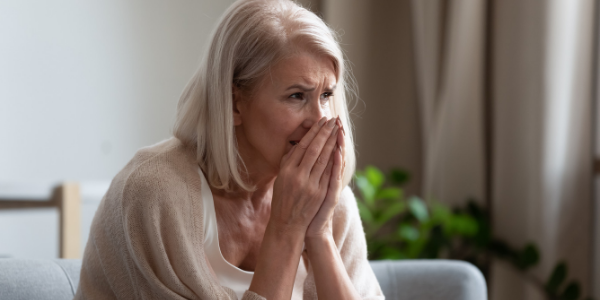You may have thought the frequency of anxiety and panic attacks in older adults would become less common with age and perspective.
But as you or your loved one has aged, you’ve learned that a wider perspective on life hasn’t necessarily brought more peace. In fact, older adults are often more anxious and panic-riddled than they were when they were younger.
Why is this such a common struggle that so many older adults battle to overcome?
In this article, we’ll take a look at understanding the increased anxiety and panic attacks in older adults.
The Root Causes of Anxiety and Panic Attacks in Older Adults
With life experience comes many stressors related to health issues, losses of loved ones, and many other difficult life changes and experiences that build up more and more as we age.
Because of this, it’s common for older people to become more anxious than they used to be. In fact, there are surveys that show that one out of every five older people suffer from anxiety that is so severe that it requires treatment.
But beyond the psychological triggers, common medical issues in older people can also directly contribute to negative feelings of anxiety or panic attacks.
Some of these medical disorders include:
- Neurologic illness
- Heart disease
- Thyroid issues
- Hormonal problems
For older adults who take a lot of prescription drugs, it’s important to note that anxiety is a common side effect of many of the drugs you may be taking. Some of these include:
- Corticosteroids
- Drugs for ADHD
- Asthma medications
- Thyroid medicine
- Drugs for seizures
- Medicine for Parkinson’s disease
If you’re on any of these medications and are experiencing an increased number of panic attacks, talk to your doctor about what options you have.
Panic Attacks and Anxious Feelings Don’t Decline With Age

But these emotional struggles are very serious medical illnesses that impact about 40 million adults in the U.S. Panic attacks in older adults mostly involve irrational, excessive fear and can become chronic issues if they aren’t properly treated.
Some of the symptoms of panic attacks include:
- Heavy perspiration
- Dizziness
- Pounding or racing heart
- Numb hands or feet
- Fainting
- Chest pain
- Nausea
- Feeling of being smothered
- Fear of losing control
- A sense that you’re losing your mind
- A fear that you’re about to die
Those suffering from OCD (obsessive-compulsive disorder) may be constantly haunted by thoughts they don’t want or the overwhelming desire to engage in certain rituals. They may become obsessed with dirt or germs and wash their hands constantly. They also feel a strong drive to check on random things over and over.
Post-Traumatic Stress Disorder
PTSD can develop in people after experiencing a scary or overly traumatic event. Older adults battling with PTSD will often have memories that repeat over and over. They may experience these memories while they’re awake or in nightmares while they sleep. These flashbacks can sometimes be so powerful that they feel real.
PTSD victims may:
- Struggle with sleep
- Feel detached from the world
- Be easily scared or startled
Many also have problems with physical intimacy and can become overly aggressive or violent.
Social Phobias

Symptoms of social phobia include:
- Sweating
- Blushing
- Shaking
- Nausea
- Difficulty speaking
Typically, severe cases of social phobia require professional treatment.
Anxiety and Panic Attacks in Older Adults Don’t Need To Be Debilitating
These disorders can be successfully treated with psychotherapy and medication. But it’s important to remember that not all anxiety disorders are treated the same. This makes it vital that a doctor first determines the specific problem you or your loved one is facing.
Although medications can’t cure anxiety disorders, they can help older adults lead more normal lives by keeping major symptoms under control.





